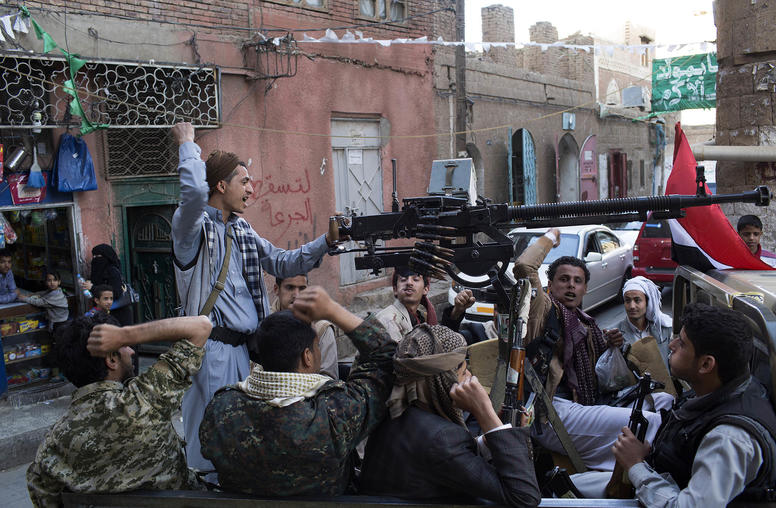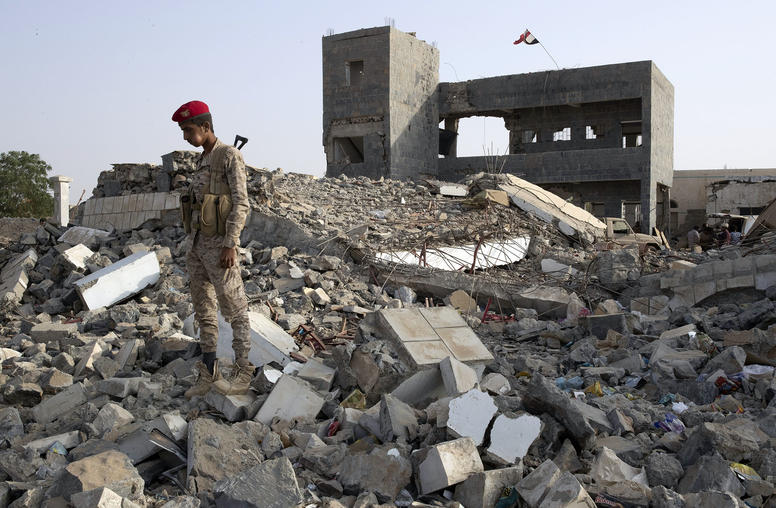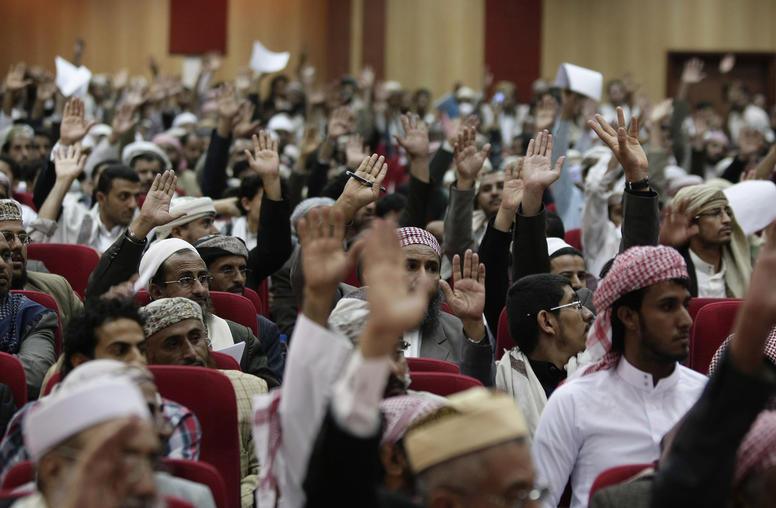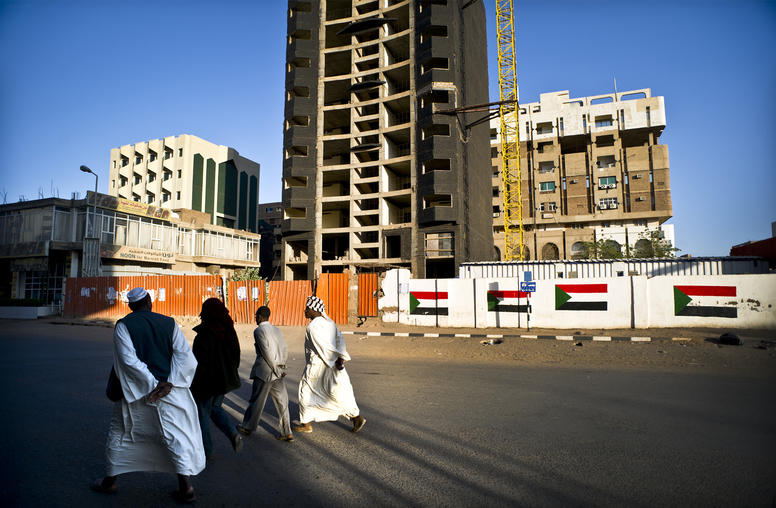The Future of Yemen
Key Yemeni opposition figures discussed their determination to end the 32-year rule of President Ali Abdullah Saleh and consolidate their country’s intensifying political uprising in a rare video conference that connected them in the capital Sanaa with an audience gathered at the United States Institute of Peace in Washington. The April 5 event was co-sponsored by USIP and the National Democratic Institute (NDI), with USIP Executive Vice President Tara Sonenshine and NDI’s regional director for the Middle East and North Africa, Les Campbell, moderating.
April 8, 2011
Key Yemeni opposition figures discussed their determination to end the 32-year rule of President Ali Abdullah Saleh and consolidate their country’s intensifying political uprising in a rare video conference that connected them in the capital Sanaa with an audience gathered at the United States Institute of Peace in Washington.
The April 5 event was co-sponsored by USIP and the National Democratic Institute (NDI), with USIP Executive Vice President Tara Sonenshine and NDI’s regional director for the Middle East and North Africa, Les Campbell, moderating. It featured four opposition leaders who called for Saleh to step down amid growing violence against protesters, his continued public defiance and U.S. and international efforts to broker a peaceful end to Saleh’s rule over the impoverished, politically fractured Arab nation.
Saleh, who has held power since 1978, has been considered a key ally in U.S. counterterrorism efforts, focused on rooting out Al-Qaida in the Arabian Peninsula, which has established its base in Yemen’s remote governorates. Among the poorest countries in the Middle East, more than 45 percent of Yemen’s 24 million citizens live below the poverty line. Though its north and south unified in 1990, Yemen still faces a significant rebellion from its Shiite Houthi tribe in the north and a secessionist movement in the south—both of which have expanded during the country’s current turmoil.
Saleh prevailed in a popular election in 2006, but he has ruled by consolidating power within the presidency and his ruling General People’s Congress (GPC) party and by pitting various political and tribal factions against each other. Promised political and economic reforms never materialized, fueling anger and calls for democratization that erupted on the streets of Sanaa and other cities following the successful, popular uprisings in Tunisia and Egypt. The Obama administration, along with European Union and Arab countries, has attempted to mediate a peaceful transition. Saleh has said he will not stay in power beyond the end of his term in 2013 but has rejected demands for an immediate resignation in what analysts believe is a bid to cut a more favorable exit deal for himself and his family.
The four oppositionists speaking at the USIP/NDI video conference focused on the dynamics of the revolution and their vision for a post-Saleh Yemen.
A democratic future.
With some analysts puzzling over what a post-Saleh government would look like, the opposition figures emphasized that a future government will embrace democracy and a robust civil society. “We have a vision for a civic state,” said Mohammed Qattan, a longtime political activist who is currently the spokesman for the opposition coalition, known as the Joint Meeting Parties. “You see civil society being born.” Qattan, who also heads the Executive Council of the Yemen Congregation for Reform (Islah), emphasized the broad inclusion of all tribes and even portions of the current military in the opposition movement. “This is the basis for a democratic society that is emerging,” he said. “This revolution is a social contract for creating a new contract [of governance].” Sheikh Mohammed Abu Lahoum, a former foreign relations department head of the ruling GPC party who has helped found a new moderate party, sought to assure the Washington audience that “chaos will not happen.” Lahoum urged optimism and said that Yemen had arrived at “a crossroads.” Calling for a peaceful transition and reconciliation efforts, he said, “We would all like to have a Yemeni model we can all be proud of.”
Dealing with Saleh.
The two other opposition speakers at the USIP forum took a harder line on dealing with Saleh, whose sons and other family members occupy key positions in Yemen’s security forces and elsewhere in the government. Tawakkol Karman, chairwoman of Women Journalists without Chains, argued, “It is the demand of our young revolutionary cohorts. He needs to stand behind bars.” Shadi Khosruf, a student protest leader who is leading a group in drafting a “Youth Revolution Document,” echoed that sentiment. Reflecting longstanding allegations of corruption by Saleh’s family, Khosruf also vowed, “We will strip them of all the public assets they have.” Karman said she hoped that other countries would freeze any assets under their jurisdictions belonging to the Saleh family. The political party leaders speaking at the forum—Lahoum and Qattan—took a more cautious stand about Saleh’s fate. Reflecting the complexity of discussions reported between Saleh’s inner circle and mediators, Qattan observed that “the president has several options. We don’t have any conditions [on his stepping down] except no transfer of power to any relatives.”
Risks of delay.
There was considerably more unity among the oppositionists on the issue of how quickly Saleh should leave office. “The longer the president stays, the more bloodshed will result,” warned Lahoum. “Events are deteriorating quite fast.” Added Karman, “Any procrastination will lead to higher cost in human terms and economic terms.”
The U.S. role. The four speakers all appeared to welcome what the New York Times has reported as a quiet shift in the U.S. position toward Saleh—a conclusion that he is not willing to make necessary reforms and should step aside. However, no policy change has yet been formally announced. Some of the oppositionists want stronger U.S. efforts to hasten his departure. “Please press harder. Saleh should leave now,” said Karman. She added that Yemenis have recently become “more comfortable” with the U.S. position, saying, “We believe that you are with us.” Khosruf, in an apparent reference to the United States, said, “You have to make your bet on the people, not the regime.” Qattan said he, too, hoped that Western leaders would urge Saleh to step down as they eventually did with Egypt’s resigned president, Hosni Mubarak.
Explore Further
- Learn more about this event
- Countries and Regions: Yemen
- Women in Yemen's Protests
On the Issues by Mary Hope Schwoebel | April 4, 2011 - The Unfolding Situation in Yemen
On the Issues by Steven Heydemann | March 28, 2011



